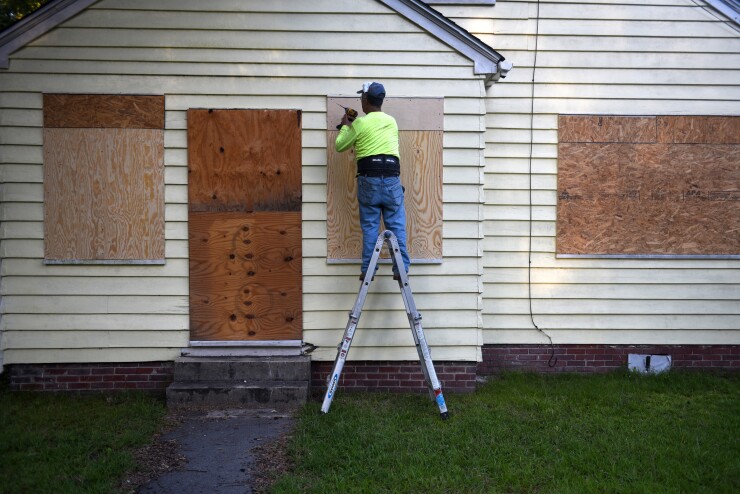While the severity of Florence was reduced prior to Friday morning's landfall, mortgage servicers are taking proactive steps in addressing the emergency situation.
To aid those affected and help curb delinquencies, many servicers are rolling out emergency assistance initiatives for the areas hit by the storm — including temporary reductions or moratoriums on mortgage payments without penalty.
"If customers are displaced or concerned, they can give us a call to talk about things. As we move closer to the storm hitting, we wait for the ZIP codes declared disaster areas through FEMA and we code our system with the information that these loans may be impacted," John Lawrence, executive vice president and chief servicing officer at BSI Financial, said in an interview.

"As part of that, we don't pursue any additional default activity. If they were already delinquent with us they wouldn't go into foreclosure over this scenario. We make sure all of our customer service reps and other workers are aware of the affected areas. Depending on when their situation settles down, we'll either modify the loan or in the case their home is uninhabitable, we look at short sales or mediation for them as well," Lawrence continued.
Freddie Mac and Fannie Mae confirmed their disaster relief policies as well.
"Once out of harm's way, we strongly encourage homeowners whose homes or places of employment have been impacted by Hurricane Florence to call their mortgage servicer to learn about available relief options. We stand ready to ensure that mortgage relief is made available," Yvette Gilmore, Freddie Mac's vice president of single-family servicer performance management, said in a press release.
"We want to ensure those in the path of Hurricane Florence have peace of mind and time to focus on their safety," Carlos Perez, senior vice president and chief credit officer at Fannie Mae, said in a press release. "Fannie Mae and our lending and servicing partners are focused on ensuring assistance is offered to individuals and families in need."
Natural disasters cause spikes in mortgage delinquencies and foreclosures. Mortgage delinquencies have recovered on a national scale from 2017's hurricane season to reach

"After last year's trio of hurricanes — Harvey, Irma and Maria — serious delinquency rates on home mortgages tripled in the Houston, Texas, and Cape Coral, Florida, metro areas and quadrupled in San Juan, Puerto Rico," said CoreLogic's chief economist Frank Nothaft in September's Economic Outlook in Disasters and Housing.
"While payment forbearance programs provided by FHA, lenders and secondary market investors can lessen the financial stress, local default rates still rise. The loss of housing and displacement of families also tends to drive up local rents and reduce vacancies," said Nothaft.
Potential damage inflicted in Florence's wake could total upwards of $5 billion in residential and commercial losses across North Carolina and South Carolina, according to CoreLogic.
Originally projected as a Category 4 with a potential reconstruction cost value of $170 billion, Florence was reduced to a Category 1 by Thursday night as it got closer to touching down. While the outlook improved, this is still a dangerous storm with catastrophic flash flooding and winds over 90 miles per hour.
Over 230,000 residential properties are estimated to be at risk and the storm's total damage will be determined by its trajectory.
"If a storm moves very quickly over the coastline and goes onshore without hesitating, it has less surge impact overall," Tom Jeffery, senior hazard scientist at CoreLogic, said in an interview with NMN.
"Hurricane Sandy was a relatively low intensity storm, dropping below Category 1 as it pushed onshore. But the problem was Sandy was so large, it just churned very slowly offshore and pushed a lot of surge water onshore over a long period of time."





